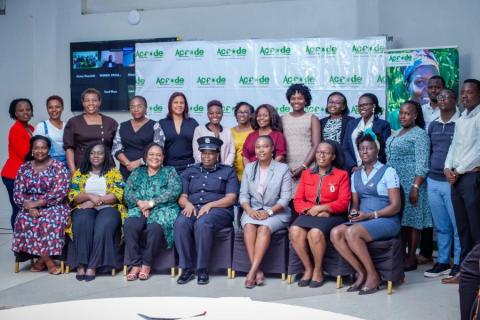
Action for Development hosted a national stakeholders’ meeting in June this year, aimed at strengthening collaboration between policymakers, organizations, and communities to combat Sexual and Gender-Based Violence (SGBV) and promote Sexual and Reproductive Health and Rights (SRHR). The meeting focused on the critical intersection of SGBV and SRHR, with ACFODE’s recently concluded project “My Right: No Violence"- Prevention of sexual and gender-based violence against girls and women in Kyaka II refugee settlement and its surroundings, funded by Eirene and BMZ.
During project implementation, several gaps and challenges with regard to SGBV prevention and SRHR promotion were documented and required the attention of policymakers for redress. In response, ACFODE developed a policy brief that highlighted key policy gaps, and provided recommendations for SGBV prevention and the promotion of sexual and reproductive health and rights (SRHR) in Kyaka II Refugee Settlement and the host communities.
During the meeting, the ACFODE Executive Director, Ms. Regina Bafaki emphasized ACFODE’s long-standing commitment to gender equality, recognizing the challenges of working within refugee settlements like Kyaka II and surrounding communities in Kyegegwa district.
She further, acknowledged the partnership with EIRENE and BMZ in implementing vital programs aimed at preventing SGBV and promoting SRHR, highlighting the importance of community-based initiatives, such as GBV clubs in schools, which provide safe spaces for students to discuss sensitive issues.
Ms. Christine Akumu Okot, representing the Ministry of Gender, also addressed the gathering, affirming the alignment of the project with Uganda's Vision 2040 and the National Development Plans (NDP III and IV). She emphasized the need for comprehensive interventions that engage parents and involve male participation in addressing the root causes of violence.
The resource person for the meeting Ms. Laureen Karayi presented critical findings from a policy brief that highlighted key challenges faced by refugees in Uganda, particularly those in settlements like Kyaka II. Uganda, currently hosting over 1.5 million refugees, faces significant challenges in providing adequate Sexual and Reproductive Health and Rights (SRHR) and protection services from Sexual and Gender-Based Violence (SGBV), despite the progress made.
Ms. Karayi outlined the population which includes about 2,776 people living in the Kyaka II refugee settlement and a combined population of 74,017 children in both the settlement refugee and host communities. However, refugees face multiple barriers, including limited access to SRHR services, education, and SGBV protections, compounded by economic vulnerability and cultural barriers. Despite progressive laws, gaps in the implementation of these policies, as well as insufficient resource allocation, continue to hinder progress in refugee settlements.
She also identified key gaps in existing policies, such as the Domestic Violence Act of 2010, which, while offering protection for survivors of SGBV, lacks sufficient enforcement in refugee settings. Other policies, such as the Gender Policy of 2007 and the Uganda National Adolescent Health Policy of 2004, while promoting gender equality and access to SRHR services, fail to address the unique challenges faced by refugee women, girls, and adolescents.
The Education Policy, which affects refugee children’s access to comprehensive sexuality education, is limited to in-school youth and does not cover out-of-school adolescents. These policy gaps, combined with the lack of youth-friendly health services, highlight the urgent need for targeted interventions to improve access to SRHR and SGBV services for refugees, particularly women and children.
Experts and representatives from the Ministries of Sports and Education, Health and Ministry of Gender, Labour and Social Development discussed key policy recommendations to enhance services related to Sexual and Gender-Based Violence (SGBV) and Sexual and Reproductive Health and Rights (SRHR) for asylum seekers and host communities in Uganda.
The meeting, hosted by ACFODE, emphasized the importance of expanding youth-friendly SRHR services in refugee settlements and host communities. The Ministry of Health was urged to develop specialized clinics that offer confidential services, such as counseling and family planning, tailored to young refugees and adolescents.
Additionally, the Ministry was advised to strengthen SGBV response mechanisms by creating comprehensive guidelines for healthcare facilities, law enforcement, and civil society organizations, and establishing one-stop centers for survivors. The Ministry of Education was called upon to integrate age-appropriate SRHR education into the national curriculum and enforce a zero-tolerance policy for SGBV in schools.
Creating safe learning environments, providing training for teachers, and promoting gender equality through initiatives such as increasing girls' enrollment in STEM were also key recommendations. The Ministry of Gender, Labour, and Social Development was urged to review and amend laws related to SGBV and SRHR to ensure alignment with international standards.
Furthermore, NGOs were encouraged to implement integrated programs that combine SRHR services with SGBV prevention and response. Discussions also focused on the need for greater collaboration between civil society organizations and government bodies to ensure that policies are inclusive and address the unique needs of refugee communities.
The meeting concluded with a call for the formation of a platform to engage relevant stakeholders, including the Ministry of Water and Environment, to improve sanitation in schools and communities.
With all the above recommendations and more put into action, it can bridge the existing gaps in SGBV and SRHR services, ensuring that people who live in the refugee and host communities have access to the Health, support, and education they need, especially if policymakers prioritize these issues and allocate the necessary resources to create lasting change. Let us work together to create a safer, healthier, and more equitable future for all.
